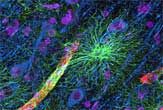
A new study finds that a cell once believed to serve neurons instead may perform the crucial function of regulating blood flow in the brain.
The discovery challenges a basic assumption in neuroscience and could have implications for interpreting brain scans and understanding what occurs during brain trauma and Alzheimer's disease.
Oxygen is the main fuel of biological cells. It is transported throughout the body by way of the circulatory system. Not surprisingly, the brain is one of the most voracious consumers of oxygen, and a basic assumption in neuroscience is that the more active a brain region is, the more oxygen (and thus blood) its neurons require.
This assumption forms the foundation for sophisticated brain imaging techniques such as PET and functional MRI scans. By scanning the brain while subjects perform certain tasks, scientists have been able to pinpoint specialized brain regions for things like emotion or language.
Star-shaped brain cells called astrocytes were traditionally thought of as housekeeping cells that helped nourish the brain under the direction of the neurons. The new study found the astrocytes can directly control blood flow without being told.
Housekeeping duty
"Neurons are completely dependent on astrocytes for their survival," said Maiken Nedergaard, a neuroscientist at the University of Rochester in New York, the study's principal investigator. "Because they're so specialized for synaptic function [the ability to connect and create memories] they've lost a lot of the basic mechanisms that most cells have to survive."
Sign up for the Live Science daily newsletter now
Get the world’s most fascinating discoveries delivered straight to your inbox.
Astrocytes produce fat-like lipid neurons used to create their outer membranes and they also produce glutamate, the most abundant neurotransmitter in the nervous system and one of the most important chemical messengers in the brain.
Recent experiments, however, revealed that astrocytes form connections with blood vessels and control the flow of nutrients, including oxygen, to neurons. When brain activity increases, neurons trigger astrocytes to release calcium, which in turn affects other chemical messengers that can cause blood vessels to either dilate or contract.
From start to finish, the process takes about 1 second.
"That's amazing; no other organs can increase their blood flow so fast," Nedergaard said.
While neurons and astrocytes usually work closely with one another, the new finding raises the possibility that there may be times when astrocytes increase blood flow on their own without any prompting from neurons.
"When we measure blood flow, it may be that we are not measuring the activity of neurons so much as that of astrocytes," Nedergaard said.
Implications for disease
If astrocytes are so important, then presumably more can go wrong if they are damaged or stop working.
"You can look at it as a poor housekeeper," Nedergaard said. "It's not able to serve the dinner [and] it's not able to remove the waste product either."
Nedergaard believes faulty astrocytes may help explain the medical mystery of why blood vessels in the brain begin to constrict after brain trauma. As hemorrhaging occurs in the brain, red blood cells begin to disintegrate and release iron.
Iron is a potent trigger for calcium release in astrocytes and can thus influence blood flow in the brain.
"What we believe is that after brain trauma, the astrocytes are so abnormal that they release compounds that constrict the [blood] vessels rather than dilating them," Nedergaard told LiveScience.
The finding could also have important implications for Alzheimer's disease.
The classical symptoms of memory loss and dementia associated with Alzheimer's are the result of neurons dying over a period of years. Brain scans of Alzheimer's patients show decreased blood flow to critical parts of the brain, and doctors have always assumed that this was because there was less of a demand for blood because there were fewer neurons to feed.
The new result could mean that Alzheimer's affects mainly astrocytes and not neurons and that blood flow to the brain is not decreased because the neurons are dying, but that the neurons are dying because there is decreased blood flow.
"It may be that for whatever reason, astrocytes are not doing their job properly, and then blood flow decreases," Nedergaard said. "This could lead to the death of the neurons, which would starve from a lack of nutrients, since the neurons depend on the astrocytes for their survival."
The finding was detailed in a recent online version of the journal Nature Neuroscience.
